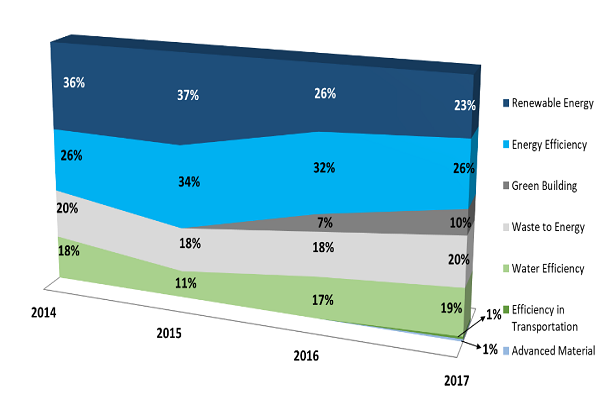The GEF and Cleantech: Evaluating Efforts to Build an Innovation Ecosystem
Global factors such as technological advances, lowered costs, available capital, consumer demand and climate change have been encouraging the development and deployment of clean technologies as part of low-carbon economic growth. To accelerate progress in this area, emerging market countries need to look at conditions to best support solution providers.
The Global Environment Facility-United Nations Industrial Development Organization (GEF-UNIDO) Global Cleantech Innovation Programme (GCIP) for SMEs is a major initiative under the GEF-5 Private Sector Strategy and seeks to leverage the power of entrepreneurship to address the most important challenges of energy and environment. Using a competition-based approach, the program identifies and nurtures the most-promising cleantech startups to receive business development training. GCIP also aims to support policy development and institutional strengthening for an entrepreneurship ecosystem.
As part of the GEF Independent Evaluation Office's (IEO) evaluations of GEF's engagement with the private sector, the IEO initiated an evaluation of GCIP in late 2017 reviewing relevance, effectiveness and sustainability of the initiative. At the time of evaluation, UNIDO had developed GCIP as 9 separate national level projects. Six of the countries had completed implementation at the time of evaluation (Armenia, India, Malaysia, Pakistan, South Africa and Turkey). Information from GCIP projects underway in Morocco, Thailand and Ukraine also informed the evaluation.
The Business Competition
By the end of 2017, GCIP had supported 795 SMEs across 8 countries. The majority of startups were active in the field of Energy Efficiency (26%) followed by Renewable Energy (23%), Waste to Energy (20%), Water Efficiency (20%), and through more recently-added categories of Green Building (10%), Transportation (1%), and Advanced Material (1%).
UNIDO statistics based on total applications initiated during 2014-2017
Twenty-five (25%) percent of teams were led by women. This is within the range for projects that set targets for female entrepreneurs (10-30% of entrants). An average of 32 startups per country benefitted from the business acceleration activities and inputs.
Innovation and Results
GCIP's new and unique value was its focus on early stage cleantech SME acceleration that encouraged global environmental benefits (particularly GHG emissions reductions). Entrepreneurs who are close to environmental and social problems were encouraged to use their indigenous insights for innovations that will help address them. Startups benefited through the development of business skills and access to mentoring, new markets, and investment. Select participating startups were able to access capital for their cleantech enterprises and attributed this to the GCIP. At least 12 startups in Armenia, India, Turkey and South Africa had success in gaining access to venture capital, more so at the national-level in comparison to the international-level events connecting the SMEs with investors.
GCIP also provided startups with privileged access to local private experts. This reliance on private sector involvement is part of an operational model that contributes to strengthening the national entrepreneurial ecosystem and sustains project results and benefits, but one which does require significant local logistics. Individuals tapped for participation are not always available for each annual run.
To varying degrees, GCIP promoted collaboration among relevant entities and equipped national institutions and other ecosystem support actors with the capacities to sustain the ongoing organization of the competition-based Accelerator. In Turkey, Pakistan, and South Africa, the projects' host institutions further established platforms with relevant organizations to assure the continued organization of the competition-based Accelerator.
Don't Forget About Policy
GCIP projects did not realize their intended outcome to strengthen the policy/regulatory environment to foster the growth of cleantech innovation. This is a risk factor for sustaining the projects' results. In most countries, no direct structured policy work was undertaken. Insufficient steering and limited resources meant that this component's activities were limited.
A Global Programme Delivered as Separate Country Projects
Global coordination between countries was implicitly indicated in project documents, however without a specific budget assigned for this management activity. Cross-country scrutiny would have been more naturally carried out on a regular basis and generated lower transaction costs if the GCIP had been implemented under an overall program or global project framework with resources for coordination between projects. GCIP did not readily realize the results aggregation, cross-country network building and knowledge exchange foreseen in the individual Project Approval Documents.
It Takes Time…
Among the completed GCIP projects, almost all were delayed and had no-cost extensions, prolonging their activities by up to 2 years. This mostly stemmed from delays in the initial stages related to understanding the concept, engaging the counterpart, and establishing a project management unit. All institutions expressed strong interest in continuation after project completion. However, the ability to finance the project initiatives remained mostly unsecured. Countries that ran more than 2-3 competition-based Accelerator cycles had greater success in transitioning the project to national institutions for continued delivery. UNIDO's continued association was indicated as vital to successful continuation and project reputation.
Tracking Benefits
Monitoring and evaluation was amongst the GCIP's weaker areas of implementation. UNIDO has estimated impacts suggesting some tangible progress being made along this route, however it is too early to verify expected long-term results. This challenge is exacerbated by a lack of standardized methodology for target setting and projection of impacts.
GCIP projects require mechanisms for systematic follow-up and verification with assisted entrepreneurs on achievements in terms of GHG emissions avoided, jobs created, and investment facilitated. This could potentially include a requirement that beneficiary startups periodically provide relevant data to the local host organization (or platform) for a period into the future, when impacts are achieved and can be reliably quantified and verified. The startups that are developing technologies which generate environmental benefits also generate significant social co-benefits beyond climate change. GCIP should also capture and report on these co-benefits.
GCIP Phase 2 – Things to Keep in Mind
Going forward, the potential for cleantech SMEs in developing countries is estimated to be a USD 1.6 trillion market opportunity.
Any future “GCIP” or similar program should be structured using a more globally coordinated approach with appropriate choice of interventions based on strategic country selection.
The program should be able to present standardized GEB benefits to a large and growing impact investment community that is looking specifically for the creation of GEBs as part of the return on investment.
Countries should be selected strategically based not only on their willingness to use allocated GEF funding for a project, but also factors concerning their current state and readiness to support cleantech innovation, particularly the mandate and capacities of the host institution and the way in which cleantech innovation is a part of national environmental and development strategy.
The GCIP policy strengthening component needs to be adequately scoped, sufficiently resourced, embarked on at an early stage, with appropriate direction and according to local conditions.
The national host's mandate to coordinate, convene and communicate with actors already working in-country to support clean technology innovation should also be clarified and strengthened.
Sufficient time is needed to ensure that the transition to a national entity takes place during the project period. The GCIP experience thus far attests that without this attribute, the initiative seems destined to not continue or may continue with significant delay, sacrificing important momentum.
Startups pointed to limitations related to quality of networking activities with investors and business partners. GCIP should tap into a broader private sector network to access the desired external expertise and integrate industry-specific technology challenges for more beneficial collaborations. Processes that are involved in regularly renewing private sector support should be streamlined.



